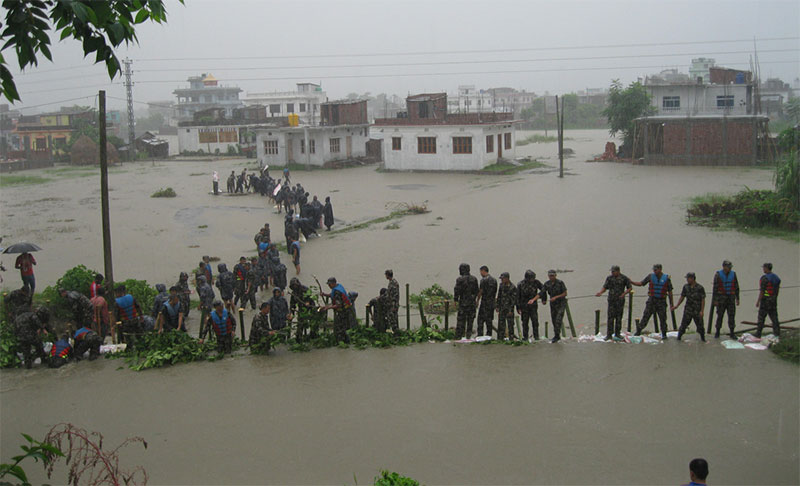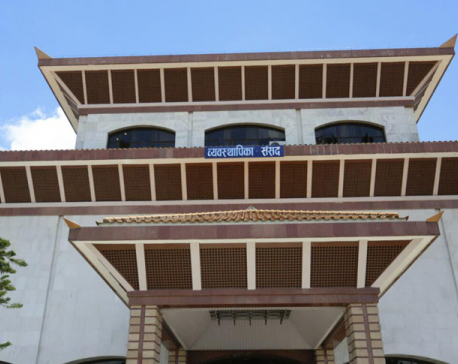
OR
Provincial govts ill-prepared to tackle disasters
Published On: July 21, 2019 07:05 AM NPT By: REPUBLICA DISTRICT BUREAU

KATHMANDU, July 21: Constraint of resources and lack of planning continue to hit the rescue, relief and rehabilitation works as the provincial governments fail to bring measures to cope up with the rising disasters.
A series of natural disasters has killed more than 12,000 people and affected thousands of households since the mega earthquake of 2015.
The floods that started with late monsoon this year have killed more than 80 people and displaced tens of thousands of households across the country.
Despite recurring natural disasters over the few years, the provincial governments appear ill-prepared to tackle them, let alone minimize the risks.
The provincial governments’ lack of preparedness was laid bare as flash floods swept large swathes of the tarai plains.
The victims have been accusing officials at provincial governments of doing little more than posting their photos on Facebook.
“Instead of working on disaster management sincerely, the government officials looked keen in publicizing the pictures of officials distributing Bhuja/Chiura (puffed rice/beaten rice) through Facebook. The people had to face hardship as the government officials indulged themselves on Facebook,’’ said Suryaraj Rai, a provincial assembly member of Province 1.
The Province 1 government, for instance, started rescue works several hours after the flood had swept various villages. After much criticism against its apathy, the government has announced Rs 200,000 to families of those killed in the floods and up to Rs 50,000 to those injured. But many affected families are still living in makeshift shelters without food and clean water due to delays in relief distribution.
Thousands of people are still waiting for relief in Province 2, one of the most affected provinces by the recent floods. The people accused the provincial government of turning a blind eye to their plight.
Province 3 is still collecting data of the affected families. Officials said they would soon announce a relief package for the affected families.
Compared to other provinces, Gandaki Province and Karnali Province were least affected by the floods and landslides this month. But the two provinces also lack a solid preparation to tackle possible disasters.
Officials in Sudur Pashchim Province said that they have completed all preparations for disaster management. Contrary to their claims, the province still lack funds or resources required to handle a major disaster.
As questions rise over their ineffective handling of disasters, officials defend them saying the works fall under the jurisdiction of the district natural disaster management committee.
“We were working in coordination with the district. That might be the reason why people failed to notice our works,’’ said Kamal Bahadur Thapa, spokesperson for Province 1 government.
The provincial governments look even more apathetic to invest in disaster risk reduction. Not a single province has done anything to modernize early warning system and strengthen the institutional setup.
Experts say that many deaths and economic losses resulted from floods this year could have been avoided had the authorities and agencies concerned been better prepared with effective early warning systems and rescue and relief mechanism.
“The disaster risks are not determined by any state of emergency occurred. It is rather measured through the prevention and mitigation that is previously worked on, monitored and effectively assessed.” Sunil Sun Shakya, an expert and consultant at UNICEF and UNDP, said.
The laws require all three tiers of the government to bring plans and policies on disaster management and risk reduction. But many are yet to formulate the related laws.
You May Like This

Lawmakers draw govt. attention for effective rescue, relief and rehabilitation of flood victims
KATHMANDU, Aug 15: Lawmakers have urged the government to pay attention in immediate and effective rescue, relief distribution and rehabilitation... Read More...

NC urges for effective relief and rescue of landslide and flood victims
KATHMANDU, July 3: The Nepali Congress has urged the government to forward effective rescue and relief of the landslide victims... Read More...

NC calls for prompt rescue of and relief to flood, landslide victims
KATHMANDU, July 1: The Nepali Congress has demanded that the government take immediate measures to rescue the families affected by... Read More...










Just In
- Heavy rainfall likely in Bagmati and Sudurpaschim provinces
- Bangladesh protest leaders taken from hospital by police
- Challenges Confronting the New Coalition
- NRB introduces cautiously flexible measures to address ongoing slowdown in various economic sectors
- Forced Covid-19 cremations: is it too late for redemption?
- NRB to provide collateral-free loans to foreign employment seekers
- NEB to publish Grade 12 results next week
- Body handover begins; Relatives remain dissatisfied with insurance, compensation amount







Leave A Comment